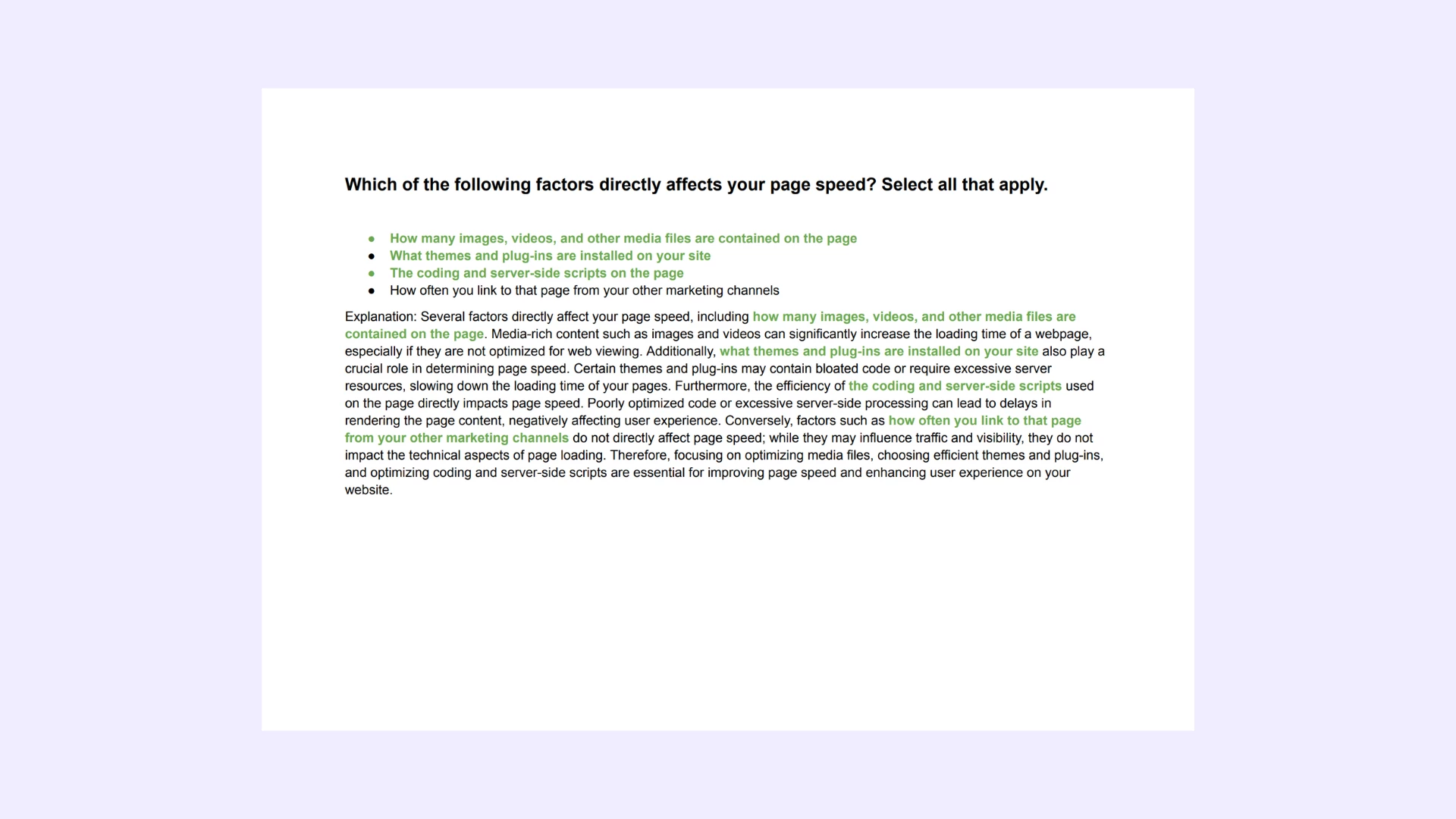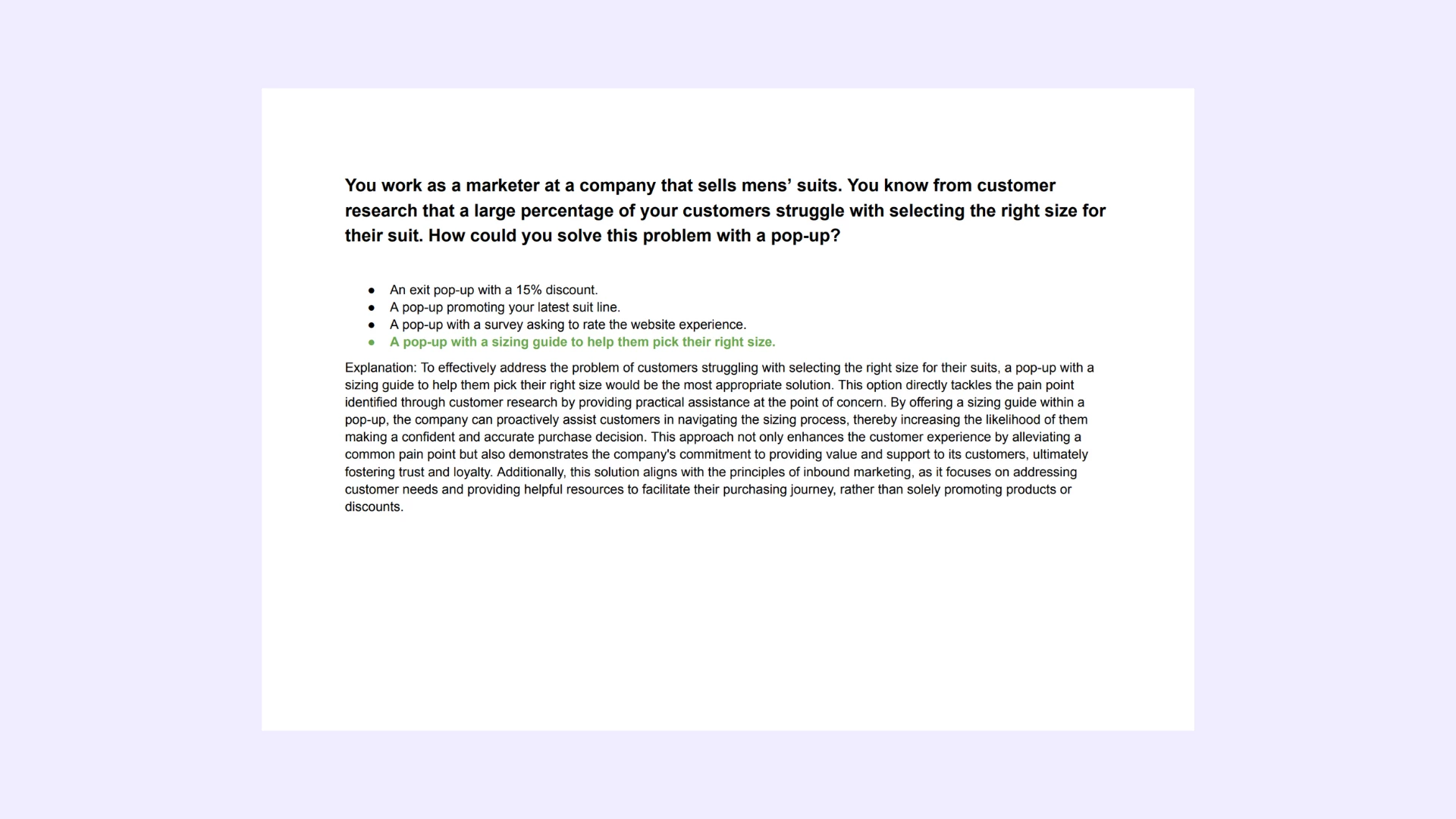Your company's marketing team is aiming to enhance its tracking capabilities to better understand user behavior across the web. A team member suggests that recent changes in privacy laws and data protection would make this easier. As an expert in the field, how do you respond?
Agree wholeheartedly and propose investing more in tracking technology.
Caution them that recent changes in privacy laws and data protection have made tracking individuals across the web more challenging, not easier, and suggest that other methods should also be explored.
Propose that they ignore these laws as they aren’t likely to be enforced and focus entirely on tracking users.

HubSpot Roll. Includes Answers for Every Real HubSpot Certification Exam.
All-in-One: Get all HubSpot exams answers with explanations in one bundle. This package includes answers for every current HubSpot certification. Regular updates to reflect the latest exam version. -> See what's included.


Need a single cerification exam answers? Check out our -> list of certification exams answer keys. Learn Smarter. Obtain or Renew your certificates with peace of mind!
Explanation: Your company’s marketing team is aiming to enhance its tracking capabilities to better understand user behavior across the web. A team member suggests that recent changes in privacy laws and data protection would make this easier. As an expert in the field, how do you respond?
Explanation: As an expert in the field, I would respond by cautioning the team member that recent changes in privacy laws and data protection have made tracking individuals across the web more challenging, not easier, and suggest that other methods should also be explored. This response is correct because recent regulations such as the General Data Protection Regulation (GDPR) and the California Consumer Privacy Act (CCPA) have significantly tightened restrictions on the collection, processing, and tracking of user data, particularly across the web. These laws prioritize user privacy and data protection, requiring companies to obtain explicit consent from users for data collection and providing them with greater control over their personal information. Consequently, tracking user behavior across the web has become more complex and requires strict compliance with regulatory requirements to avoid potential legal and reputational risks. Instead of solely relying on tracking technology, companies should explore alternative methods such as first-party data collection, anonymized analytics, and contextual targeting to gather insights into user behavior while respecting privacy regulations. By adopting a multi-faceted approach to tracking capabilities and prioritizing compliance with privacy laws, companies can enhance their understanding of user behavior without compromising user trust or risking legal consequences. Therefore, it is essential to recognize the challenges posed by recent changes in privacy laws and data protection and approach tracking capabilities with caution and compliance in mind.

Special Bundle Offer HubSpot Roll. All in One
Note: We conduct daily checks for updates on the exam, ensuring that the file contains the most recent questions from the actual certification program.
Questions | Answers | Explanations. FREE Updates.
You may also be interested:
- Special HubSpot bundle offer - all HubSpot exams in one
- HubSpot CMS for develpers certification exam answers
- HubSpot CMS for develpers II certification exam answers
- HubSpot content hub for marketers certification exam answers
- HubSpot content marketing certification exam answers
- HubSpot contextual marketing certification exam answers
- HubSpot digital advertising certification exam answers
- HubSpot digital marketing certification exam answers
- HubSpot email marketing certification exam answers
- HubSpot frictionless sales certification exam answers
- HubSpot growth driven design certification exam answers
- HubSpot inbound certification exam answers
- HubSpot inbound marketing certification exam answers
- HubSpot inbound marketing optimization certification exam answers
- HubSpot inbound sales certification exam answers
- HubSpot integrating with HubSpot I foundations certification exam answers
- HubSpot marketing hub software certification exam answers
- HubSpot reporting certification exam answers
- HubSpot revenue operations certification exam answers
- HubSpot sales enablement certification exam answers
- HubSpot sales hub software certification exam answers
- HubSpot sales management certification exam answers
- HubSpot sales software certification exam answers
- HubSpot seo certification exam answers
- HubSpot seo II certification exam answers
- HubSpot service hub software certification exam answers
- HubSpot social media marketing certification exam answers
- HubSpot social media marketing II certification exam answers